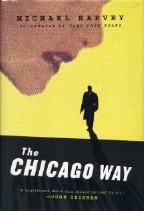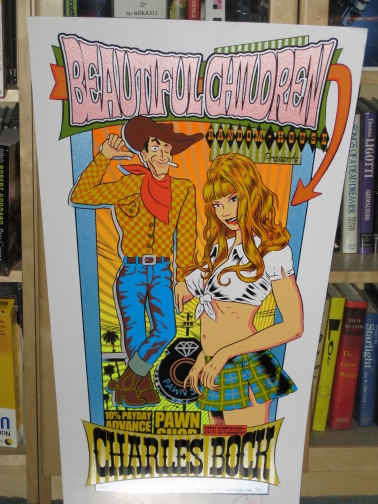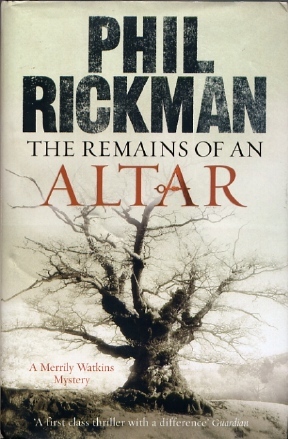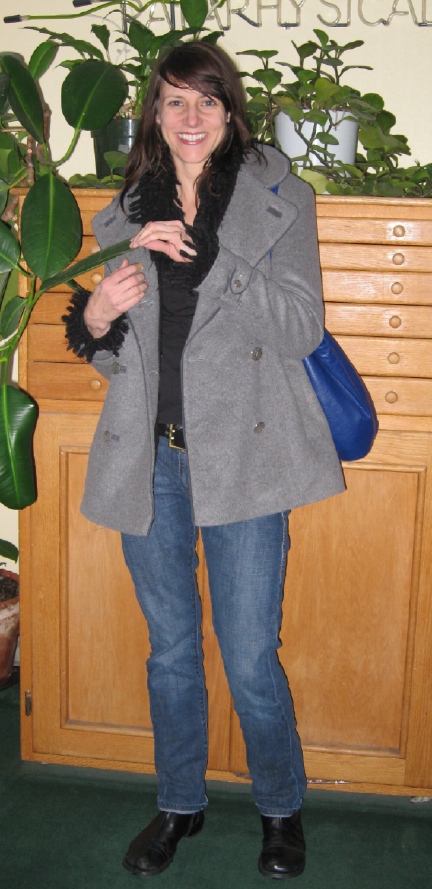|
|
|
|
This Just In...News
From The Agony Column
|
| |
|
02-08-08 : John Meaney Sings 'Bone Song' ; Agony Column Podcast News Report
With Jeremy Lassen : Nuts and Bolts of Book Distribution
|
Fantasy Noir
Genre
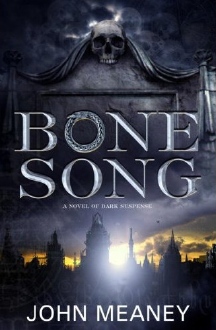 |
|
| A
light shines in the darkness. |
The fantasy noir
novel 'The Sword-Edged Blonde' by Alex Bledsoe from Night Shade Books
was the first in line; now it's time to get ready for the Fantasy Noir
Explosion. Not that this is anything particularly new. Glen Cook's
Garrett novels blazed the trail, of course, starting in 1987 with 'Sweet
Silver Blues' up to his most recent entry, 'Whispering Nickel Idols'
in 2005. Now we can add the uber-talented John Meaney to
the list of those expanding the boundaries of both fantasy and mystery
fiction with 'Bone Song' (Spectra / Bantam / Random House ; March 4,
2008 ; $24). And while the novel has all the outward aspects of the
other entries in this tightly-defined genre – a fantasy / science-fiction
urban setting and a lone-wolf protector – you can be assured
that he brings his own unique talent to bear.
'Bone Song' unpacks in Tristopolis, a city powered by necrofusion piles,
reactors that process the dead and bring power to the living as well as to
many variants thereof. Donal Riordan is your lone wolf, a Lieutenant who
is assigned the task of guarding a celebrity diva. The problem is that there's
a new drug on the market, and the means of making it involves human sacrifice.
The more desirable the victim, the more powerful the dose, and Donal's charge
is very desirable.
This sort of fantasy-style setting is somewhat new for Meaney, who is the
author of the highly-regarded Nulapeiron Sequence ('Paradox', 'Context',
'Resolution'), and the equally good prequel 'To Hold Infinity'. First published
in the UK by consistently excellent and ground-breaking Victor Gollancz under
the editorial guidance of Simon Spanton, the Nulapeiron Sequence was published
in the US by Lou Anders over at Pyr, who gave us four gorgeous hardcovers
with the Jim Burns cover art intact. The Nulapeiron Sequence was, like Alastair
Reynolds' 'Revelation Space' and it's sequels, one of the New Space Operas
that combined gorgeous literary prose with dense, hard science fiction invention.
The result was work that harkened back to both Frank Herbert's 'Dune' and
Ian M. Banks' Culture novels. Meaney's contribution was a powerful and liquid
prose style that immersed the reader in his deeply-imagined universe.
The same prose and imaginative sensibilities are at work in 'Bone Song',
though the setting is quite different. In place of fragrant, dripping biotech,
we have fragrant dripping death-tech. In place of extravagantly designed
layers of technology, we have extravagantly designed layers of supernatural
existence. Whats interesting is that though the settings are very
different, the reading experiences are not so different. Meaney's writing
exudes hidden menace and invokes layers of reality beyond our immediate senses
that are nonetheless threatening and immanent. There's a numinous quality
to the prose.
Meaney's evocation of a fantasy city is also unique and highly informed by
his science fiction sensibilities. You'll meet a wide variety of beings and
some of the most unique main characters you're going to encounter in any
piece of speculative fiction. But Meany has a way of drawing his surreal
characters, be they gargoyles, zombie or invisible free-wraiths – that
makes you feel that there's a sort of organic logic to them. You're inspired
to imagine a whole technological backdrop that makes perfect sense, that
dots the i's and crosses the t's with regards to their origin and their relationship
to one another, a sort of species-genus family tree. But you dont
have to read all about it. Meaney's a master of light and shadow, using one
to suggest the other and using the two together to weave a world that makes
sense.
When I first wrote about
this novel in October of last year, the only available copy was
the UK version from Gollancz. Now you can pick up the US version from
Bantam Spectra, and while cover is decent, it's no match for those
Jim Burns' covers done for the Nulapeiron Sequence. That's kind of
a shame; the Burns art really does create an atmosphere conducive to
imagining the world that Meaney brings to life in his prose. Still,
the prose is the thing. Meaney is simply a great writer. If youre
looking for an intelligent, impressionistic piece of fantasy noir that
will immerse you in a world that lingers even when you're not reading,
'Bone Song' is a fine choice.
|
Agony Column
Podcast News Report With Jeremy Lassen : Nuts and Bolts of Book
Distribution : "It's not a completely corrupt process"
 |
On today's Agony
Column Podcast News Report, I speak with Jeremy Lassen,
the publisher of Night Shade
Books, about the nuts and bolts of bookselling. Its pretty
easy to think the books come onto the shelves and – that's that.
You buy 'em or don't. But the through-line is a lot more interesting
and complicated, and as Jeremy told me with regards to those little
standee displays at the front of the store, "It's not a completely
corrupt process."
Jeremy and I also talked the PGW bankruptcy, a breakdown brought about by
shady dealings that killed the beloved-by-me Thundermouth and Carroll & Graf
imprints. It's a wild ride with money disappearing down corporate ratholes
and into the oblivion of the court system. You
can hear the alarmingly-clear but torrid tale from this MP3 link. It
might make you think twice about keeping your money in a supposedly-safe
bank like Wells Fargo. Who knows who owes?
|
| |
|
02-07-08: Steve Toltz Looks for 'A Fraction of the Whole' ; Agony Column
Podcast News Report NPR First Book Series 5 Michael Harvey
|
The Great Australian
Novel
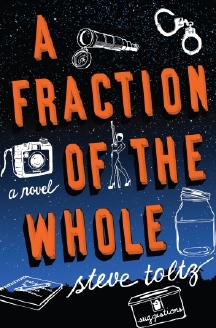 |
|
| Not
wild about that cover, really. |
It's hard to miss
the Great American Novel genre; you know, Big, Important Books About
Little, Unimportant People. Richard Ford's 'The
Lay of the Land' is an excellent example of this species, as is
T. C. Boyle's 'Drop
City'. These novels are full of The Stuff of Life, and generally
speaking, that Stuff is really interesting to read about when a Great
writer gets a hold of it.
But the existence of the Great American Novel suggests that other countries
should be producing their own local variant, and as if to affirm this suggestion
up pops 'A Fraction of the Whole' (Spiegel & Grau / Random House ; February
12, 2008 ; $24.95) by Steve Tolz, stepping in as The Great
Australian Novel. Wheels within wheels and stories within stories. 'A Fraction
of the Whole' fires off with Jasper Dean's keester in the klink. To tell
his story, he's got to tell his father's story; and to tell his father's
story, he's got to tell his uncle's story. Martin Dean and Terry Dean respectively,
the latter (Uncle Terry) a notorious bank-robber, are a real pair. Terry
blazes a path into martyrdom, Martin merely goes to Europe, returning with
Jasper. There's a bit of story to all this; let Steve Toltz tell you about
it.
And you'll enjoy the hell out of this oddball odyssey. Tolz is a born comedian,
and as you might gather, this book is very funny and very Australian. There's
no damnable 9/11 angst here, just a lot of loot, boots and criminals in cahoots.
Jasper is educated at home by Martin, and Martin is well – unusual. "In
this way I was not self-educated so much as force-fed, and in truth I liked
them all well enough. The Greeks, for example, had fine ideas about how to
run a society that are still valid today, especially if you think slavery
is wonderful." Just about every sentence that Toltz writes is filled
with humor and insight, the former dark, the latter enlightening. This is
a book full of the stuff of a smart life, lived fully if not exactly well.
I mean, you can't get much fuller of life than to go on a cross-country killing
spree, but the upshot of such a full life is likely to be on the fatal side.
'A Fraction of the Whole' does have all the stuff, but it is peculiarly Australian.
There's a sort of wild-west, rough-edge to this book that you wouldn't find
in the USAian variant, and a lack of security-conscious naval gazing that
is refreshing. It's pretty simple. Tolzs is consistently funny. Pick up this
big-ass book – it's 530 pages – flip through it and read a few
passages. If you dont find anything you consider funny, put it down,
because it ain't your cuppa. On the other hand, I'm pretty sure most readers
of this column will find it funny. And those of you who do are not only well-advised
to shovel out the miniscule amount of dough your local independent bookstore
is going to ask, its suggested that you try to catch Tolz on tour
and get the damn thing signed. Here's
a link to publisher's list of tour dates, and for once in my tattered time
here, I'm a bit early.
I just checked and in spite of my suspicion, this at least claims to be a
first edition with no previous Australian edition. First edition, right there
on the colophon page. Think of getting in on the John Kennedy Toole 'A Confederacy
of Dunces' tour, or maybe an early John Irving gig. This guy sis that kind
of mordant funny, that kind of serious thinker. As this is a big book, theyre
probably going to slap it into the most rarified realms they can, but reclaim
your literature. Stride the seas. Read a big ol' Great Australian Novel,
and enjoy the bile. Once in a while, publishers get it right. Better not
let that opportunity slip by!
|
Agony Column
Podcast News Report NPR First Book Series 5 Michael Harvey : The
Deadline Effect
|
|
|
| Michael
Harvey and his first novel; he tells me the next is ready
to go! |
Today's Agony Column
Podcast is a fine downloadable
MP3 (this is the link to the file) version of my recent report
for NPR on First Book author Michael Harvey. One of
the markers of a great book for me is whether or not I can remember
where I was when I read it, and I sure as heck have this one firmly
ensconced in the shattered remains of my tiny brain. I read this during
the Singularity Symposium late last year, and the dissonant effect
of the reading ; classic, cool mystery prose – versus the event – hyper,
high-tech evangelism – just swept me away. Here's
a link to the NPR page. Feel free to go there and email that story
using the button.
|
| |
|
02-06-08 Update: NPR First Books Series Six With Link
|
Charles Bock 'Beautiful Children' on All Things Considered
Today
|
|
Welcome
back my friends to the show that never ends. |
I've just been informed that NPR's
All Things Considered is going to run
my report on author Charles Bock, whose first novel is 'Beautiful Children'.
It will run towards the end of the first hour of the show, which, depending
on your local affiliate, may or may not be the first hour you hear. You
can find a program guide for today's All Things Considered from this link.
As soon as I have it, I'll post a link to the NPR website for the report
itself, and readers can support The Agony Column by emailing the heck out
of the story. Expect as well, on Monday, the complete and extremely fascinating
interview with the author and a review of the novel, which is quite spectacular.
In the interim, I'm posting a photo of the limited edition poster for the
novel by Chuck Sperry. Welcome, indeed!
The full, unedited interview will be podcast on Monday, February 11. But if enough people ask I'll
podcast it sooner.
Update: Here's the Link to the NPR story; email this story early and often, thanks!
|
| |
|
02-06-08: A Review of Phil Rickman's 'The Remains of an Altar' ; Agony
Column Podcast News Report : Laurie R. King Live at KUSP, January 25,
2008
|
Music in the
Literary Landscape
|
|
Nice
covers too, evocative of the novels.
|
Once in a while
I allow myself the pure pleasure of comfort reading. We all have our
favorites, those writers who offer us a reliable jolt of reading pleasure.
For me, nothing is better than a tour of the Welsh borderlands with Phil
Rickman. This week, I'm catching up on some reviews, and I
admit that I gave myself a pretty easy task when I pulled out 'The
Remains of an Altar' for a long, slow, luxurious read. You know the
sort of reading I'm talking about; you take your time, immerse in the
language and the characters of a series. Rickman's Merrily Watkins
novels are amongst my favorites, and this entry is superb. It explores
the Malvern Hills and the origins of Edward Elgar's music as well as
the effects of modern civilization sprawling out over an ancient landscape. You
can read my review here.
For my money, for any money, Rickman is writing some of the best fiction
that you can hope to find. I also love the generous printing that he gets
from Quercus, which makes an already pleasurable experience even more enjoyable.
While you can get this book in paperback, I'd always say to spring for the
hardcover of any Rickman. If you can imagine a modern collaboration between
M. R. James and Henry James on a mystery series set in Wales, you've got
the idea. These books are what reading is all about. Immerse.
|
Agony Column
Podcast News Report : Laurie R. King Live at KUSP, January 25,
2008 : Your Questions, Answered

|
|
Laurie
R. King at KUSP ; her latest novel.
|
Today's podcast
is nicked from the archives over at KUSP, because even though I brought
my recorder into the studio when I interviewed Laurie R. King for
Talk of the Bay a couple of weeks back, I simply didn't have the time
get it switched on – I was on the wrong side of the board. But
fortunately for those readers who might have had their questions answered
but were unable to hear the live broadcast, it all goes into the ENCO,
and the ever-trusty Steve got it back out for me. Here's
a link to my podcast of the live interview with Laurie R. King, with
the local literary calendar elided for your listening pleasure. King
is a wonderfully entertaining guest, and we made sure to answer all
the questions you submitted. I'm hoping to have King back soon, so
we can address a wider variety of topics – and answer more of
your questions.
|
| |
|
02-05-07 : Terry
D'Auray Reviews 'Blue Heaven' by C. J. Box ; Agony Column Podcast
News Report : SF in SF Panel
|
Rapture and
Respect
|
|
...but
maybe not your blue heaven.
|
Today we welcome
back Terry D'Auray with her
review of 'Blue Heaven', the latest mystery by C. J. Box.
In a perfect world, I'd not sleep at all, and then I'd have time to
read the other books that I'd like to read. 'Blue Heaven', reviewed
here by Terry D'Auray, is certainly one of those books. I met C. J.
Box at the Left Coast Crime gathering in Monterey a couple of years
back, and he was so warm and kind, standing there in the bar with a
big ol' hat – he had that kind of quiet power in his voice that
clearly comes across in his writing.
[Let me here note that this is another reason why it is worth your valuable
time to get out to these events when they show up in your neck of the woods.
Meeting a writer can really shift and enhance your experience of reading
their books. The bottom line; you might find more authors to read. And that's
always a good thing.]
Terry adds: "I met C.J. Box at a book signing at M for Mystery and
was impressed by his open friendliness and his writing talent, and
a bit perplexed by that big ol' hat. Was it a PR gimmick, an affectation
or his signature style? Over the next several years, every time I
saw a photo of Mr. Box, he was wearing that big ol' hat. Until now.
On the dust jacket of 'Blue Heaven', he appears hatless. Which I
take to mean absolutely nothing!"
It's a delight to have Terry back on topic focusing her keen intellect and
witty style on more great books; or at least in this case, on this great
book. I'm sure you'll enjoy the review, and readers should note that in the
fullness of time I have a number of reviews to turn in, and that I intend
to do so. But in the interim, I'm thrilled to have Terry D'Auray writing
about mysteries.
|
Agony Column
Podcast News Report : SF in SF Panel: Terry Bisson, Peter S. Beagle,
Mark Ferrari Discuss Fantasy
|
|
| Golden
skies, the Golden Gate, great science fiction, what more
can you ask? |
Today's podcast
is the final portion of the SF in
SF gathering on January 19, 2008. As I hope you have learned to
expect, this is a panel discussion, moderated by Terry Bisson and featuring
the guests for that evening, Mark Ferrari and Peter S. Beagle. It features
as well a few audience members who asked questions, so – you
know who you are! I'm hoping next time to do a little stand-up myself,
just to make sure that the audio quality keeps improving. I'd really
love to have audience members (you know who you are!) come up to a
mic and talk. I know it involves getting out of one of those extremely
comfortable seats, but if you truly support SF in SF, and you should,
then please consider stepping up to the mic next time around. And with
that admonition, I
turn you over to this MP3 link to the discussion.
Hopefully, next time:
Paolo Baciagalupi and Carter Scholz
Saturday, February 23rd, 7:00PM
I'll see some readers; feel free to come up and introduce yourselves. I'm
the guy hovering over the mixer, creating the
MP3 file you can find from this link. In fact, that's generally where
I am.
|
| |
|
02-04-08: A 2008 Interview With Beth Lisick
|
'helping me help myself'
|
|
Beth
Lisick gets down on the Pataphysical Farm. |
Beth
Lisick woke up on New Year's Day, 2006, and decided to change her life. Frankly,
she
wasn't doing so badly before. Her first book of non-fiction,
'Everybody into the Pool' had been remarkably well-received, and with
good reason. It's compulsively readable, excruciatingly funny and, well – it's
just a generous gift to those who read it. You like this gal. So all
that, and still she wants to be better. And as you start reading 'helping
me help myself' (William Morrow / HarperCollins ; January 2, 2008 ; $24.95),
you can't help but cheer her on. Her premise and promises are so inspired
that a book which unfolds over a year is likely to be read in a day.
Put succinctly, Lisick chose one expert per month for ten months of 2006.
With each expert, she attempted to immerse herself in their regime with
the expectation that she would, well – improve! The results are
hilariously funny, but sweet and evenhanded – even when she's dealing
with 'Men are from Mars, Women are from Venus' author John Gray. What
emerges is itself a sort of self-help book. Combining self-deprecatory
humor with keen-eyed inspection, Lisick is an expert observer of our
bizarre cultural milieus. She writes wonderful prose that makes you laugh
and think a lot. Her books are super smart, easy-to-read and lots of
fun. If youre looking for a book that pretty much anyone will
like, these are those books.
In person, Lisick is just as easygoing and fun as she is on the printed
page. She really does have all the enthusiasm you read in her books,
and actually, more. You
can easily hear this in MP3 audio of our conversation about
both books, her time as a spoken word artist and everything else on her
mind. In fact, just being in the same room with her brought to
mind a scene she describes in 'helping me help myself'. She attends a
Las Vegas book convention and herself is happy to get a free hotel room
and board. But when she hears that superstar Chuck Palahniuk is getting
a substantial cash payment as well, she decides to attend his talk and
see what all the fuss is about. Of course, readers here know what all
the fuss is about. Lisick finds herself in a room packed with rabid fans
who hang on Palahniuk's every word as he tosses out bloody mannequin
stumps and gross jokes. She really can't get over the adulation Palahniuk's
fans bring to the table.
To my mind, Lisick herself could easily inspire the same kind of attention,
the same kind of adulation. Listen to what she has to say; read what
she had to write, I think you'll see hear / read it as well. Lisick is
so much fun, she makes your day a better day for having heard or read
her. My take is that readers should get on the bandwagon now – not
because it will eventually get very crowded, though. You should do so
because you're going to have one heck of a good time! If reading should
be fun, then this should be reading.
|
| |
|
|





